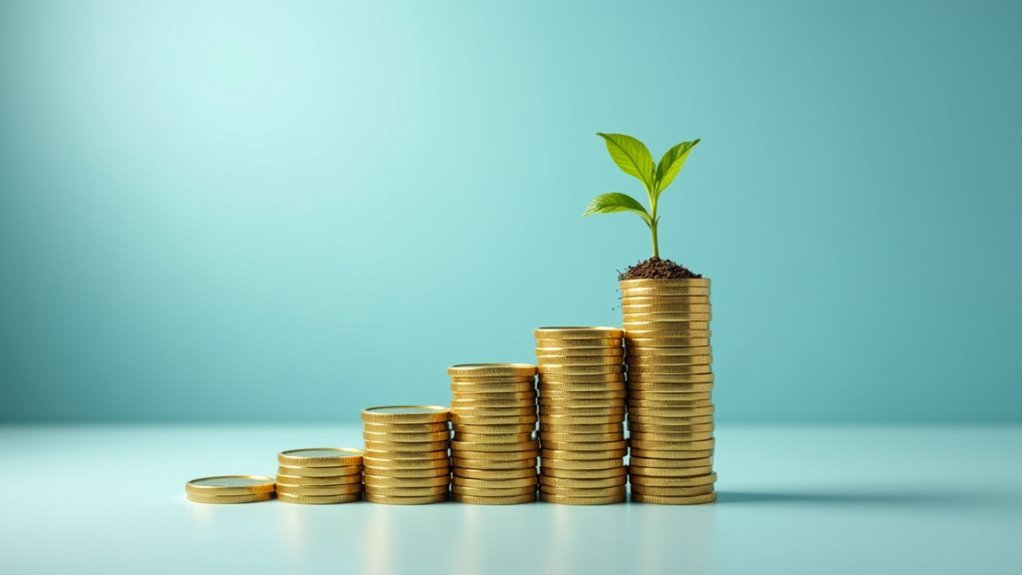Compound interest is money’s secret weapon. It transforms modest savings into substantial wealth by earning returns on both initial investments and accumulated interest. Time is the magic ingredient – the longer money compounds, the more dramatic the growth. Whether through savings accounts, CDs, or reinvested dividends, compound interest keeps working 24/7. Even small interest rate differences add up big over decades. The eighth wonder of the world has more secrets to reveal.

Money makes money – that’s the essence of compound interest. Unlike its boring cousin simple interest, which only works on the principal, compound interest is a mathematical powerhouse that creates “interest on interest.” It’s the financial equivalent of a snowball rolling downhill, getting bigger and bigger as it goes. The concept is simple: you earn returns not just on your initial investment, but on all the interest you’ve already earned too. This financial concept traces back to ancient Mesopotamian times.
The math behind it isn’t rocket science, but it packs a punch. That innocent-looking formula A = P(1 + r/n)^(nt) is what makes millionaires over time. Banks love using it, especially when it comes to your credit card debt. A $100,000 loan will accumulate about $64,700 interest over 10 years with monthly compounding at 5%. Speaking of which, compound interest is a double-edged sword – it can either make you wealthy or bury you in debt. When it works for you, it’s magnificent. When it works against you, it’s brutal. Like dollar-cost averaging, it’s a strategy that removes the emotional aspect of timing the market.
Time is the secret ingredient in this financial recipe. The longer money compounds, the more dramatic the results. A measly 5% return compounding over decades can turn into something spectacular. That’s why financial nerds call it the “eighth wonder of the world.”
And frequency matters – daily compounding will give you better returns than annual compounding. It’s like getting extra shots of espresso in your financial coffee.
This mathematical marvel shows up everywhere in finance. Savings accounts, CDs, retirement accounts – they all use compound interest. Even reinvested stock dividends get in on the action. The real kicker? Small differences in interest rates can lead to enormous differences in final amounts. That’s why high-yield savings accounts are worth their weight in gold compared to regular savings accounts.
Tools for calculating compound interest are everywhere. The Rule of 72 is a quick and dirty way to estimate how long it takes money to double. But honestly, in today’s world, there’s an app for that. Or a website. Or a spreadsheet. Pick your poison.
Frequently Asked Questions
Can Compound Interest Work Against Me When I’m in Debt?
Compound interest absolutely hammers people in debt.
It’s brutal math – unpaid balances grow exponentially as interest gets charged on previous interest charges.
Credit card debt at 20% APR? That $5,000 balance balloons to over $7,300 in just two years. Minimum payments barely touch the principal.
Meanwhile, payday loans with 400% APR can spiral out of control within weeks.
The numbers don’t lie – compound interest shows no mercy.
What Investments Typically Offer the Highest Compound Interest Rates?
CDs and high-yield savings accounts currently offer the highest guaranteed compound rates, hitting 5%+ in some cases.
Real estate investment trusts follow close behind, yielding 3-8%.
But here’s the kicker – dividend stocks, while offering lower initial yields around 2-5%, can potentially outperform through a combo of dividend growth and price appreciation.
No free lunch though – higher potential returns mean higher risks.
How Does Inflation Affect Compound Interest Earnings Over Time?
Inflation is a sneaky wealth-killer that steadily erodes compound interest gains. At 3% annual inflation, those seemingly nice returns can get cut down to size pretty fast.
Real returns (what actually matters) equal nominal returns minus inflation – simple math. A 7% return becomes a measly 4% in real terms.
Over decades, inflation can eat away a third or more of compound interest earnings. Brutal.
When Should I Start Investing to Maximize Compound Interest Benefits?
Starting investment early is essential for compound interest.
Someone who begins at age 20 versus 30 can accumulate dramatically more wealth by retirement. The math is simple – more time equals more compounding cycles.
Early investors need to save less monthly to reach the same goals. Every year of delay means missing out on potential exponential growth.
It’s a classic case of time being money.
Are Compound Interest Earnings Taxed Differently Than Regular Income?
Compound interest gets zero special treatment from the IRS – it’s taxed just like regular income. Period.
The money gets taxed in the year it’s earned, whether you withdraw it or not. That’s the deal with savings accounts, CDs, and bonds.
The only escape? Tax-advantaged accounts like IRAs, 401(k)s, and Roth accounts. Or municipal bonds, if you’re into that whole tax-free thing.








